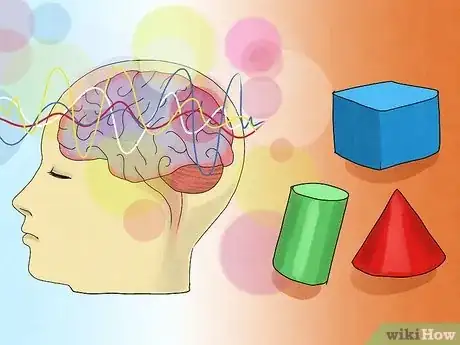This article was co-authored by Jennifer McVey, Cht. Jennifer McVey is a Spiritualist, Seer, and the Spiritual Director of Spiritual Answers and Solutions. With more than 22 years of experience, she specializes in manifesting, ghosts and spirit attachments, hypnotherapy, channeling, and spiritually based life coaching. Jennifer has also published 13 Affirmation Image and six Word Search Puzzle books in spirituality and self-help and has produced over 600 audio sessions.
There are 15 references cited in this article, which can be found at the bottom of the page.
wikiHow marks an article as reader-approved once it receives enough positive feedback. In this case, 100% of readers who voted found the article helpful, earning it our reader-approved status.
This article has been viewed 95,499 times.
Metaphysics is a branch of philosophy investigating the fundamental nature of reality and being. Simply, it answers two basic questions: "What is there?" and "What is it like?" A person who studies metaphysics would be called either a meta-physicist or a metaphysician. Metaphysics is a multidisciplinary field of study. It is difficult to specialize in all fields, so a basic knowledge of all included areas is recommended. With a little effort and research, you’ll be able to learn everything you want to know about metaphysics.
Steps
Learning the Basics
-
1Introduce yourself to some basic metaphysical concepts. Start by understanding the basic concepts of physics, math, logic, and philosophy. It seems difficult but introductory level books and Internet research can help. These fields are all crucial to your learning about metaphysics in general.
- Understand the philosophy of mathematics. Do not simply solve sums. Understand the concept of numbers and patterns in the universe.
- Gain a sound understanding of concepts related to physics. Concentrate on Einstein’s theory of relativity which explains how motion works by moving at constant, relative speeds between different inertial frames of reference.[1]
-
2Learn how to tell whether an object is abstract or concrete. Metaphysics deals largely with understanding the difference between concrete and abstract objects. A concrete object is something quantifiable – a thing that you can physically touch or see. An abstract object is less definable because it is not something represented physically, but something embodied by an idea. For example, a number is an abstract object because it correlates to the idea of counting or measuring something. The physical thing being counted is a concrete object.[2]
- An abstract object does not exist in any particular time or space (such as ideas, mathematical objects, and fictional entities). Abstract objects are often called “particulars” or “universals.”
- Morality is considered causally inert because being good or bad doesn’t cause something to happen. It is merely an idea that qualifies or categorizes a thing.
- Metaphysicians are mostly concerned with the nature of objects and their properties.
Advertisement -
3Study quantum physics. Quantum physics posits that objects have a dual type of nature – what is known and what is not known. Simply, one cannot determine every unknown aspect about a particular object because there is always something beyond human knowledge, something unknown.[3]
- Quantum physicists believe that determinism was proven incorrect with the Heisenberg uncertainty principle. The Heisenberg uncertainty principle claims that there is a limit to what one can know about things; therefore, nothing can ever be fully known.
-
4Research cosmology and cosmogony. Metaphysical Cosmology is the branch of metaphysics that deals with the origin and development of the universe. It addresses questions about the universe beyond the scope of physical science.
- Cosmology is the study of how the world/universe operates. An example of a question cosmologists try to answer would be, “What is the purpose of the cosmos?”
- Cosmogony is the study of how the world/universe originated. An example of a question cosmogonists try to answer is “Did the Big Bang event create the idea of time itself?”
-
5Consider whether you believe in determinism or free will. Determinism proposes that every event — including every human decision and action — is the "inevitable and necessary consequence" of prior occurrences.[4]
- Determinists believe a human being's future depends on present and past events beyond the individual's influence. In philosophy it is believed that human decision is based on past events.
- Since metaphysics is related to the study of questions about existence, creation, and what it all means, there is a clear link with religion. Deciding whether you believe in determinism or not is a key factor in furthering your personal understanding and study of metaphysics because this is the foundation of how people interact with the world. If there is no free will, then humanity’s relationship with the world is much different than if they do have free will. Your study of metaphysics hinges largely on how you personally understand this one aspect.
-
6Study the relationship between metaphysics and religion. Since metaphysics often focuses on the origins of the universe and the connection of humans to the universe, religion often comes in to play. Scientifically, the study of metaphysics deals with much more than just the religious aspects; however, those who want to teach and understand the more abstract elements of metaphysics usually do so under the umbrella of religion.[5]
- Religion attempts to provide a metaphysical understanding of human existence, so the two are closely related.
Studying Metaphysics in Your Free Time
-
1Read articles on the internet. One way to learn about metaphysics in your free time is to spend some time browsing the topic on the internet. Of course, you’ll need to be careful about where you get your information – make sure you only read articles from reputable sources.
- Any article from a .edu URL should contain information that was fact-checked by an expert in the field.[6]
-
2Follow metaphysical organizations. If you are interested in expanding your knowledge about metaphysics, try to get involved in organizations that deal with this area of study. At the very least, you should read the organizations’ websites to stay up-to-date on new ideas in the field and information about further learning.
-
3Subscribe to newsletters. Many professional and academic organizations create regular newsletters that they send out to all of their members containing information regarding news in the field, updates on society issues, and interesting publications on the topic. You may have to pay a fee to get the newsletter, but it is a great way to get more information on a topic you’re interested in.
- The Metaphysical Society of America has an email list that you can subscribe to in order to receive information from their organization.
- The Metaphysical Society also has a newsletter you can subscribe to.
-
4Attend conferences. A great way to learn about a topic is by attending conferences hosted by organizations that are devoted to the study of that particular topic. To learn more about metaphysics, try to attend some conferences aimed at understanding metaphysical topics.
- Consider attending the annual conference hosted by the Society for the Metaphysics of Science (SMS).[10]
- Try to attend the annual meetings held by the Metaphysical Society.
-
5Read primary texts. Primary texts are the foundational texts for any field of study. These are the books and academic articles that other scholars and researchers build on in their additional analyses of the topic.
- For metaphysics, some important primary texts to familiarize yourself with include Aristotle’s “Metaphysics,” Plato’s Phaedo, and The Nature of Metaphysics by D. F. Pears.[11]
Studying Metaphysics in a Guided Manner
-
1Take courses in metaphysics. There are many institutions that offer courses on the metaphysical sciences – like the University of Metaphysical Sciences.[12] These kinds of courses will allow you to study metaphysics with the help of trained professionals who will guide you in your journey toward understanding.
- These courses will help you learn about various metaphysical philosophies as well as aid you in your path toward a career relating to the metaphysical sciences if that is what you desire.[13]
- Some regular universities offer courses on metaphysics too.
-
2Gain legitimacy by attaining a degree in metaphysical teachings. Getting a degree in metaphysics will allow you more prestige as a metaphysical teacher or counselor by supplying you with the academic/professional background necessary to foster the kind of trust and respect so often required in this field. A degree will help you acquire more job opportunities [14]
- A degree in the field of metaphysics will help you achieve greater potential for opportunities to involve yourself in your chosen field, a greater understanding of the world around you, and better prospects in the field of metaphysics with regard to possible future employment.
-
3Become ordained in the field of metaphysics. Many people who work as a metaphysical professional do so under the umbrella of religious affiliation. Since the law does not typically separate the religious from the spiritual, metaphysical practitioners usually become ordained in their field in order to teach and guide others in the study of metaphysics.[15]
- To become ordained as a metaphysical practitioner, you will most likely need to enroll in a training program that offers ordination as an option. Consider a program like the two year course offered by the International Metaphysical Ministry (IMM) that ordains those who complete their training.[16]
- While a metaphysical degree can help you establish yourself as a trained professional, becoming ordained in the field will legally allow you to teach your beliefs to others.
Expert Q&A
-
QuestionHow can you share metaphysical principles with other people?
 Jennifer McVey, ChtJennifer McVey is a Spiritualist, Seer, and the Spiritual Director of Spiritual Answers and Solutions. With more than 22 years of experience, she specializes in manifesting, ghosts and spirit attachments, hypnotherapy, channeling, and spiritually based life coaching. Jennifer has also published 13 Affirmation Image and six Word Search Puzzle books in spirituality and self-help and has produced over 600 audio sessions.
Jennifer McVey, ChtJennifer McVey is a Spiritualist, Seer, and the Spiritual Director of Spiritual Answers and Solutions. With more than 22 years of experience, she specializes in manifesting, ghosts and spirit attachments, hypnotherapy, channeling, and spiritually based life coaching. Jennifer has also published 13 Affirmation Image and six Word Search Puzzle books in spirituality and self-help and has produced over 600 audio sessions.
Spiritual Director Tell them to pay attention to what they're doing, because everything they do affects something else (even if they're not aware of it). Also, remind them to keep an open mind and to not get so disheartened.
Tell them to pay attention to what they're doing, because everything they do affects something else (even if they're not aware of it). Also, remind them to keep an open mind and to not get so disheartened. -
QuestionHow does metaphysics apply to life?
 Jennifer McVey, ChtJennifer McVey is a Spiritualist, Seer, and the Spiritual Director of Spiritual Answers and Solutions. With more than 22 years of experience, she specializes in manifesting, ghosts and spirit attachments, hypnotherapy, channeling, and spiritually based life coaching. Jennifer has also published 13 Affirmation Image and six Word Search Puzzle books in spirituality and self-help and has produced over 600 audio sessions.
Jennifer McVey, ChtJennifer McVey is a Spiritualist, Seer, and the Spiritual Director of Spiritual Answers and Solutions. With more than 22 years of experience, she specializes in manifesting, ghosts and spirit attachments, hypnotherapy, channeling, and spiritually based life coaching. Jennifer has also published 13 Affirmation Image and six Word Search Puzzle books in spirituality and self-help and has produced over 600 audio sessions.
Spiritual Director If you open your mind to the idea that there's an answer for everything that's happening (and that there's no separation of God and nature), almost anything and everything you could run into in your life would either have an explanation or would get you to where you could find an explanation or deeper understanding of it.
If you open your mind to the idea that there's an answer for everything that's happening (and that there's no separation of God and nature), almost anything and everything you could run into in your life would either have an explanation or would get you to where you could find an explanation or deeper understanding of it. -
QuestionWhat is the importance of metaphysics?
 Qurat-ul-Ain MuradCommunity AnswerMetaphysics is basically the study of literally everything that exists. Technically, It tells us that the world is slightly an illusion or is it real. It's importance is that it tells us that those truths and that knowledge whose nature must be understood to understand it's position in the world and in a human's life.
Qurat-ul-Ain MuradCommunity AnswerMetaphysics is basically the study of literally everything that exists. Technically, It tells us that the world is slightly an illusion or is it real. It's importance is that it tells us that those truths and that knowledge whose nature must be understood to understand it's position in the world and in a human's life.
References
- ↑ http://www.space.com/17661-theory-general-relativity.html
- ↑ http://plato.stanford.edu/entries/abstract-objects/
- ↑ http://www.forbes.com/sites/chadorzel/2015/07/08/six-things-everyone-should-know-about-quantum-physics/#7ba237b841f8
- ↑ http://www.informationphilosopher.com/freedom/determinism.html
- ↑ http://www.wisegeek.com/what-is-the-relationship-between-metaphysics-and-religion.htm
- ↑ http://plato.stanford.edu/entries/metaphysics/
- ↑ http://www.metaphysicalsociety.org/
- ↑ https://www.worldmeta.org/
- ↑ http://www.spiritsvision.com/NHMS/welcome.html
- ↑ https://sites.google.com/site/socmetsci/2016-sms-conference
- ↑ http://plato.stanford.edu/entries/aristotle-metaphysics/
- ↑ http://umsonline.org/career.htm
- ↑ http://whatismetaphysics.com/
- ↑ http://www.cms.edu/career.html
- ↑ http://www.cms.edu/career.html
- ↑ https://internationalmetaphysicalministry.com/


















-Step-10-Version-3.webp)























































